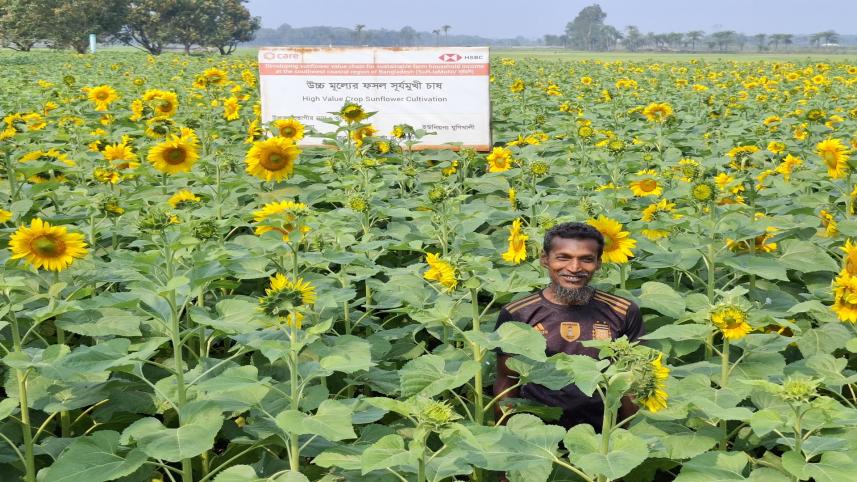HSBC partners with CARE to promote climate-resilient farming in coastal southwest

HSBC, in collaboration with CARE Bangladesh, is expanding its climate-resilient agriculture initiative in the southwest coastal area of Bangladesh through a project, titled "Sunflower Radiance Journey towards Adaptation in a Market-oriented and Nature-based Initiative" (SURJAMONI).
The initiative aims to strengthen the sunflower value chain and promote adaptive vegetable farming, benefiting communities in Satkhira district, according to a press release.
The project addresses key agricultural challenges faced by smallholder farmers, particularly those impacted by salinity and limited access to financial services, quality inputs, and adaptive farming techniques. It focuses on the highly climate-vulnerable yet agriculturally rich regions of Kalaroa and Tala upazilas in Satkhira.
Md Abdul Moti of Tarulia village in Satkhira shared: "For 13 years, my field near the mango orchard remained unproductive and seasonally fallow due to salinity and lack of irrigation. With SURJAMONI's support, I cultivated sunflowers on one bigha (33 decimals) and got an unexpectedly good yield and profit, which will help me expand my agricultural activities."
Ram Das, country director of CARE Bangladesh, said: "The SURJAMONI project is poised to drive long-term economic and environmental resilience among the target groups and inspire many more in southwest coastal Bangladesh."
By equipping farmers with climate-smart agricultural practices, enhancing market access, and fostering sustainable value chains, this initiative will continue to create lasting impacts."
Md Mahbub ur Rahman, chief executive officer of HSBC Bangladesh, noted:
"Through this partnership with CARE Bangladesh, the SURJAMONI project will strengthen local economies and empower farmers with climate-resilient agricultural solutions."
By fostering sustainable practices today, we are helping to build a more secure and prosperous future for generations to come."
Currently, more than 26,000 hectares of fallow land in the area remain underutilised due to soil salinity.
SURJAMONI seeks to turn this challenge into an opportunity by promoting the cultivation of saline-tolerant sunflower varieties, ensuring proper storage of sunflower seeds, and strengthening local and national value chains for edible oil production.
Since its launch in 2024, SURJAMONI has reached more than 600 households, supporting them in adopting climate-smart agricultural practices.
In its first year, about 100 farmers cultivated sunflowers on around 27 acres of seasonal fallow land, producing nearly 25 tonnes of sunflower, yielding over three times more profit than traditional mustard cultivation.



 For all latest news, follow The Daily Star's Google News channel.
For all latest news, follow The Daily Star's Google News channel.
Comments